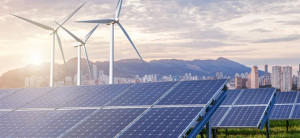
Relatively few countries in the world have both excellent and consistent wind and sunshine resources; South Africa is one of them.
With the cost of renewable energy decreasing at an exponential rate, there is no reason SA cannot become a global solar super-power within the next few decades.
This is the opinion of Ramez Naam, a computer scientist, futurist and co-chair for energy and environmental systems at Singularity University, who spoke at the SingularityU South Africa Summit, in Johannesburg this week.
Naam said the cost of solar power plunged 250 times over the last 40 years, from $77 to 30c, and will continue to fall.
Wind power and batteries that store solar energy are following the same trend in price reduction, he said.
Carlo van de Weijer, director of the Strategic Area Smart Mobility centre at Eindhoven University of Technology in the Netherlands, said during the summit: "Energy is going to get so cheap that we will make fuel from electricity, not the other way round."
The energy business disruption from coal to solar will take 20 or 30 years, said Naam, but it is inevitable.
Naam shared a quote by one of Saudi Arabia's previous oil ministers, Sheik Ahmed Zaki Yamani: "The Stone Age didn't end because of the lack of stone, and the oil age will end long before the world runs out of oil."
SA is currently looking into building nuclear plants. Naam said nuclear energy is suited to places in the world where sunshine and wind is not readily available, not South Africa.
"For the price you are likely to pay for nuclear reactors, you will be able to supply two to four times more energy to customers with wind or solar."
Oil and coal kills
"Energy is a moral and health issue," noted Naam. "There are still 1.3 billion people who don't have access to modern energy, and people dying from polluted air."
A study published by the World Health Organisation last year showed 5.5 million lives were lost in 2013 to diseases associated with outdoor and household air pollution. It estimated these deaths cost the global economy about $225 billion in lost labour income in 2013 and more than $5 trillion in welfare losses.
In SA, there are 20 000 deaths per year from air pollution, more than deaths related to traffic accidents. In China, the number of air pollution fatalities is 300 000, with citizens in the north of the country, where it is more polluted, having an average life expectancy that is five years shorter than those living in the south.
Local action
Naam said government needs to align policy with the future. It can do this by allowing people to build renewable energy and hook it up to the grid, by paying people for the excess energy they produce from home solar panels, and by realising coal is killing South Africans, he said.
"If they do not act quickly, they risk being left behind. Renewable energy will allow them to export things cheaper and run large data centres."
He noted that if government does not do anything, the private sector will move in and make deals with regional governments to supply cheaper electricity to consumers.
This is already happening. Earlier this month, Nesa Investment Holdings (NIH) opened its second capital-raising round, providing investors with an opportunity to invest in SA's renewable energy sector.
The fund invests in a portfolio of commercial rooftop solar energy projects and related technologies, and earns revenue through operating, renting and maintaining these projects to its clients.
It raised over R10 million in its first funding round and hopes to reach R85 million in the second to be concluded by the end of this year.
Peter Frolich, director of NIH, says: "A transition from coal-powered energy production to renewable energy is critical to the sustainability of the South African energy grid, and the environment. National power utility Eskom is currently installing additional power capacity, but new and sustainable energy sources are key to reduce operational costs and facilitate growth."
Naam said while it is a smart time to invest in solar in SA, investors need to be able to sign a long-term contract for energy, and this will depend on government stability.
Share